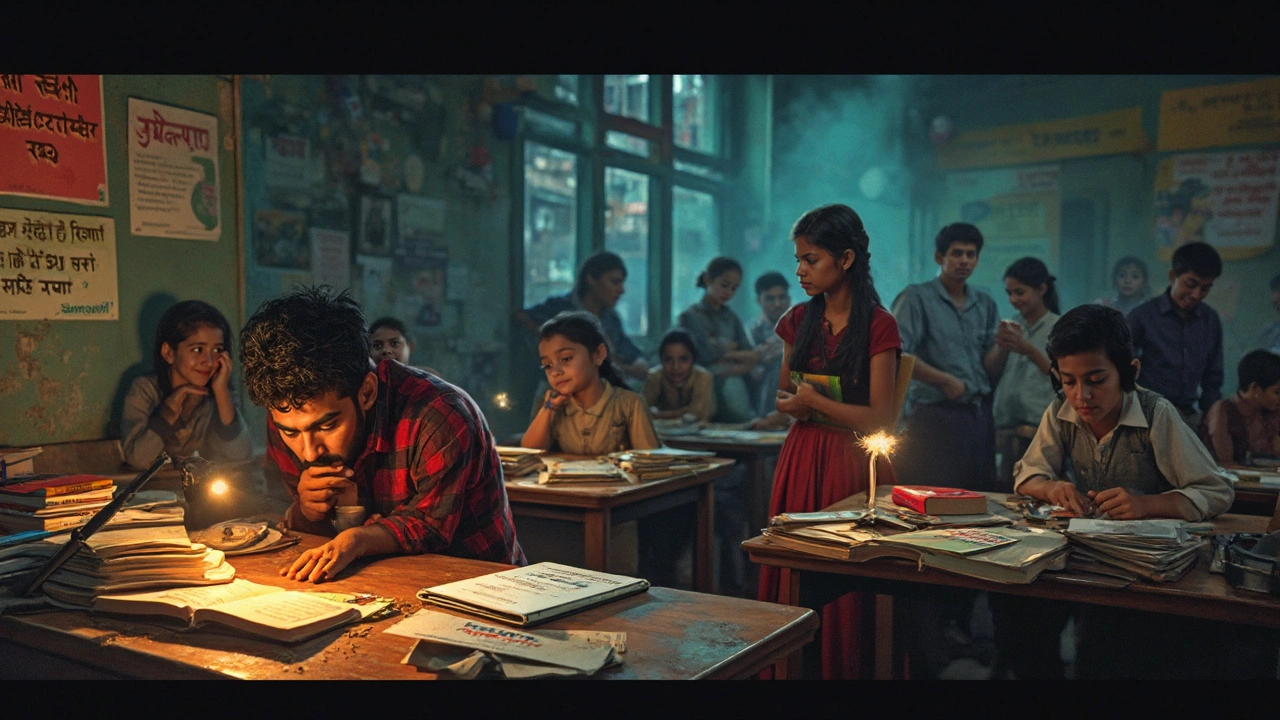Most Stressful Degree: Why Competitive Exam Courses Top the List
 May, 20 2025
May, 20 2025
Thinking of picking a degree that goes hand-in-hand with competitive exams? Get ready—these courses can turn even the calmest person into a bundle of nerves. In India, medical (NEET) and engineering (IIT-JEE) are legendary for their brutal entrance exams and non-stop competition. It’s not just the exams that drain you; it’s the years of prep, the constant comparisons with other students, and the pressure from family and teachers.
If you’re googling which degree feels the most like a pressure cooker, this isn’t just hype. A 2024 survey by the National Institute of Mental Health and Neurosciences found that over 75% of students prepping for tough entrance exams reported high stress and sleep troubles. That’s not just numbers—it’s pure anxiety playing out in real homes, with students often sacrificing hobbies, social life, and even their sanity to stay ahead in the game.
It goes way beyond just studying hard. Many students feel trapped by the fear of failing or not matching up to expectations. If you’ve ever wondered why medical and engineering seats are the holy grail, it’s because the competition is wild: for example, in 2024, NEET had 2.4 million applicants for just about 1 lakh seats. Every mark, every second, feels like life or death. Want to know how people get through this chaos without falling apart? Keep reading—we’re unpacking all the pressure points and real-life ways to cope.
- Why Competitive Exam Degrees Are So Stressful
- How the Pressure Builds Up: The Real Story
- Degrees That Top the Stress Charts
- Real-Life Student Experiences
- Survival Tips: Managing the Madness
Why Competitive Exam Degrees Are So Stressful
If you've ever felt burned out just from regular school exams, competitive exam degrees like medicine and engineering are on a whole different level. These courses are designed to filter out all but the most dedicated. It’s basically sink or swim for years.
First, the numbers don’t lie. Entrance exams for these degrees throw thousands of students into the race for a handful of seats. In NEET 2024, around 2.4 million students competed for only about 1 lakh MBBS seats. For IIT-JEE, the ratio is just as wild—close to 1.3 million students fighting for roughly 17,000 seats. That alone brings major stress. Take a look at how it stacks up:
| Exam | 2024 Applicants | Available Seats | Student : Seat Ratio |
|---|---|---|---|
| NEET | 2,400,000 | 100,000 | 24:1 |
| IIT-JEE | 1,300,000 | 17,000 | 76:1 |
| CAT (MBA) | 300,000 | 5,000 | 60:1 |
Second, the preparation is relentless. Most coaching centers run for 6-8 hours a day, plus self-study. It isn’t rare for students to hit the books for 10-12 hours—day after day, month after month. That pace is brutal.
- Family pressure is a whole different stress monster. Everyone wants you to crack the exam, and ‘what will relatives say’ becomes a nightmare phrase.
- There’s almost no room for error. Even a small slip in one exam can mean waiting a whole year to try again.
- The topics are broad and deep. If you’re doing engineering prep, you tackle advanced math, tricky physics, and crazy chemistry problems. For NEET, biology isn’t just diagrams, it’s thick textbooks and endless revision.
Worse, the results feel like they define your whole future. The constant competition creates a vibe where students don’t just study—they compare marks, ranks, and even the brand of coaching notes. Social media only adds to the stress, with students seeing everyone else’s scores plastered online.
No wonder “most stressful degree” is usually tied to these competitive exam courses. It’s not just the workload—it’s the feeling that your whole life hinges on a single test. That’s enough to make anyone sweat.
How the Pressure Builds Up: The Real Story
The stress starts early, often before someone even decides which degree to chase. Parents and teachers push young kids toward competitive exams, thinking it's the only path to a 'secure' future. This pressure gets heavier as students hit higher grades. Coaching classes pop up as early as 8th standard, with some kids spending up to six hours a day just on extra study. That's after their regular schoolwork.
The most stressful degree options, like medicine or engineering, are tied directly to high-stakes entrance exams. Anyone stuck in this grind knows it's way more than memorizing facts. You're expected to perform through endless mock tests, random 'surprise' quizzes, and weekly feedback sessions. Rankings and raw scores become a regular weekend feature at home, too.
The money side doesn’t help either. Top coaching institutes easily charge lakhs of rupees for two-year courses. Families borrow or cut back on basics just to pay these fees. The result? More guilt, more stress if you feel you aren’t improving fast enough.
| Exam | Applicants | Seats Available | Average Prep Years |
|---|---|---|---|
| NEET (Medical) | 24,00,000 | 1,00,000 | 2-3 years |
| IIT-JEE (Engineering) | 12,00,000 | 16,000 | 2+ years |
| CLAT (Law) | 80,000 | 3,000 | 1-2 years |
Add to that the digital distractions and social media FOMO. It's not just about being good—it's about being the best, because friends are always posting their ranks and achievements online. You can never really escape. Weekends, holidays, and even birthdays get taken over by extra study sessions or coaching tests. The balance between life and study? Pretty much non-existent for most students gunning for these spots.
All of this stacks up, creating a cycle of pressure that’s tough to break, even for the most motivated folks. The battle isn’t just academic; it’s mental, emotional, and for many, financial too.

Degrees That Top the Stress Charts
If you want the honest truth, some degrees stand out for their insane stress levels. Right at the top are medicine and engineering courses, thanks to their brutal entrance exams and massive competition. For medical hopefuls, the NEET exam is a non-stop grind for years. In 2024, there were around 24 times more NEET applicants than seats, with fierce cut-offs and just a handful of government spots that actually lead to affordable education.
Engineering isn’t exactly a joyride either. The IIT-JEE is known across the country (and not in a good way) for its complexity. The questions are tricky, and the race to crack a good rank is cutthroat. Why so stressful? There’s a popular notion that bagging an IIT seat means a golden ticket to a good career, but the effort to get there leaves countless students mentally exhausted.
- Most stressful degree candidates usually fall in the medicine and engineering brackets, but chartered accountancy (CA) deserves a shoutout too. The CA route, especially in India, is famous for repeated exam failures—sometimes 70-80% of people don’t clear in their first attempts. No fixed timeline means exam stress drags on for years.
- Law degrees, especially at top national law universities, bring a different kind of pressure. Their entrance (CLAT) isn’t as cutthroat as medical, but staying at the top in these colleges is no joke. Grading is tough and competition is relentless.
- In some states, government job aspirants face major burn-out prepping for banking, UPSC, and state civil services. The number of posts is tiny compared to lakhs of candidates, and students may spend five-plus years grinding with no guarantee of a post.
If you’re curious why these courses always pop up in stress surveys, it comes down to three things: ultra-tough entrance filters, limited seats, and the social status attached to clearing them. Most students don’t get a break from the pressure, and that’s why these degrees top every stress chart out there.
Real-Life Student Experiences
Let’s get into what it actually feels like to live the grind of a most stressful degree. Ask anyone who’s prepped for these competitive exams and you’ll usually get the same answer: it’s tough, lonely at times, and feels like a non-stop race.
Take Pooja, a NEET aspirant from Delhi, who once said she slept just five hours a night during her final prep year. She skipped family gatherings and didn’t touch social media for months. She’s not alone—stories like hers are everywhere.
Siddharth, who aimed for IIT-JEE in 2024, shared how he went through three coaching institutes, endless mock tests, and nearly burned out when he couldn’t clear the first attempt. He said his biggest struggle wasn’t the syllabus but managing the pressure from his own parents, who checked weekly rankings more than his marks at school.
If you look at averages, here’s how most study schedules stack up for these students compared to regular degree programs:
| Course | Daily Study Hours | Time Spent in Coaching/Prep | Reported Stress Level* |
|---|---|---|---|
| Medical (NEET) | 7-10 hrs | 2+ years | High |
| Engineering (IIT-JEE) | 6-10 hrs | 2+ years | High |
| B.Com/BBA | 3-4 hrs | Minimal | Moderate |
| Arts/Humanities | 2-3 hrs | Minimal | Low |
*Based on 2024 survey data from NIMHANS with 1,200 students from top Indian cities.
Most students who make it to the finish line admit they had at least one meltdown or serious moment of wanting to quit. Peers who dropped out say that constant comparison to ‘toppers’ on social media hit their confidence the hardest.
- Many students report developing stress headaches or irregular sleep patterns during peak months.
- A significant number look for support from peer groups or online forums where they can vent anonymously.
- Some learners swear by short daily breaks and evening walks to clear their head between study marathons.
The stressful part isn’t always about the books; it’s feeling stuck in a cycle of self-doubt and proving yourself. But hearing these real stories shows that it’s not weird to struggle—it’s actually the norm. Pushing through is tough, but plenty of students find their own little ways to cope and keep going.

Survival Tips: Managing the Madness
Surviving the grind of most stressful degree courses isn’t about being a superhero. It’s about using smart, tested strategies that actually help you stay sane, focused and healthy. Let’s break down what works, straight from students, counselors, and research that’s specific to India’s competitive exam scene.
“Success is not just about hard work, but also about managing your mental well-being. Balance is key—don’t let the exam become your whole world.”
– Dr. Anuradha Bhatia, Psychiatrist, NIMHANS
First up, you can’t ignore sleep. According to a 2023 study by All India Institute of Medical Sciences (AIIMS), students who got 7-8 hours of sleep before big tests performed 22% better on average than those who cut sleep to study more. Sleep helps you remember stuff and keeps anxiety down.
Another must: break your study sessions into chunks. The "Pomodoro Technique"—25 minutes of focused work followed by a 5-minute break—has blown up in popularity because it keeps your brain from frying. Studies from IIT Bombay in 2024 back this up: students following this pattern reported less burnout and better recall during exams.
Don’t forget to move. Simple walks, skipping rope, or a bit of yoga can help. It’s not a cheesy wellness tip—exercising just 20 minutes a day can cut stress levels by nearly half, according to Indian Council of Medical Research (ICMR) data.
If you’re facing constant pressure, talk to someone. Peer groups, student counseling hotlines, or just a friend who’s not in the same rat race can make things less lonely. Over 60% of students polled by Career360 in 2024 said sharing worries kept them from breaking down.
| Tip | Why It Works | Backed By |
|---|---|---|
| 7-8 Hours of Sleep | Boosts memory, reduces anxiety | AIIMS, 2023 |
| Pomodoro Routine | Prevents mental fatigue | IIT Bombay, 2024 |
| 20 Min Daily Exercise | Drops stress hormones | ICMR, 2024 |
| Open Up to Someone | Gives emotional support | Career360 Poll, 2024 |
- Set a daily study cap. Say no to marathon sessions.
- Mix tough subjects with easier ones to lighten your load.
- Don’t skip meals—your brain needs steady fuel.
- Unplug for an hour—no phone, no notes, just chill.
- Schedule a fun activity every week, even if it’s just gaming or a movie.
Look, nobody aces tough exams by running on fumes. The real game is managing your headspace and using your time smartly. There’s no shame in asking for help; honestly, it’s smart to share the load. Your well-being matters more than any rank or result sheet.